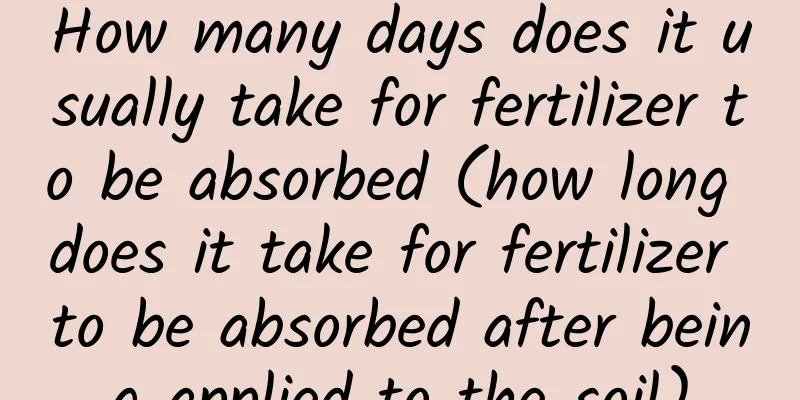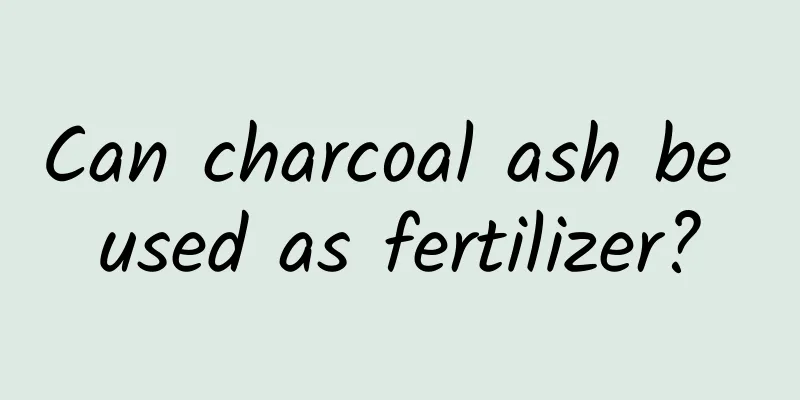How many days does it usually take for fertilizer to be absorbed (how long does it take for fertilizer to be absorbed after being applied to the soil)

|
Fertilizer is the abbreviation of chemical fertilizer. It refers to fertilizer produced by chemical methods. It refers to all inorganic fertilizers and slow-release fertilizers produced industrially. It is a general term for nitrogen, phosphorus, potassium, calcium, magnesium, sulfur, and compound fertilizers. How many days does it take for fertilizer to be absorbed? Different fertilizers have different absorption effects, that is, different fertilizers have different absorption speeds. It is also closely related to the application method, soil properties, temperature, humidity, etc. Nitrogen fertilizer has strong mobility, is absorbed faster, and takes effect faster. For example, ammonium bicarbonate may take effect in one day under suitable conditions, but when urea is applied to the soil, it may take three days or even seven days to take effect, which has a lot to do with temperature. The speed of urea decomposition depends on the activity of urease, which is the activity of soil microorganisms. The activity of microorganisms increases with the increase of temperature. The higher the temperature, the faster urea decomposes in the soil, the faster it is absorbed and the faster it takes to take effect, which can be seen in about 3 days . In winter, the ground temperature is low, the dissolution is slow, and the effect is slow, which takes about 7 days. Urea can also be sprayed on the leaves. It is absorbed quickly and takes effect quickly, and the effect can be seen in about 1-2 days . Generally speaking, ammonium bicarbonate can be absorbed in 1 day, urea takes an average of 4-5 days, phosphate fertilizer and potassium fertilizer take effect more slowly, which also depends on the properties of the soil. Compound fertilizer takes effect in about 10 days . Every year we use a lot of fertilizers, but the utilization rate is very low. According to relevant departments, the utilization rate of fertilizers in my country is only 30% on average, while that in developed countries is 50%-60%. Isn't this a waste? It also causes a lot of pollution. Therefore, my country has proposed the "double reduction" action, namely reducing the use of chemical fertilizers and pesticides and increasing the utilization rate of chemical fertilizers through rational fertilization, with the goal of reaching 40%. Reasonable fertilization and improving the utilization rate of chemical fertilizers must be carried out from many aspects. First, we must vigorously promote balanced formula fertilization, emphasize the importance of both chemical fertilizers and organic fertilizers, and apply the two in coordination. Second, we should guide farmers to understand the characteristics of fertilizers, introduce the use of fertilizers and issues to pay attention to, so that farmers can better apply fertilizers and improve fertilizer utilization. Nitrogen fertilizer should be reasonably distributed and applied according to soil conditions, crop types and fertilizer characteristics. For example, nitrogen fertilizer should be applied deeply and covered with soil in time, and base fertilizer and topdressing should be combined. It should not be applied blindly. Ammonia volatilization, nitrate nitrogen loss and denitrification loss should be avoided and reduced as much as possible. Phosphorus fertilizers should be selected according to different soils and crops to reduce fixation. It is recommended to use phosphorus fertilizers as base fertilizers, apply them in layers, and apply them in areas with dense root systems. Potassium fertilizer should be mainly used as base fertilizer, combined with early topdressing, and applied to soils with low potassium content and potassium-loving crops. In general, to improve the utilization rate of chemical fertilizers, it is necessary to appropriately increase the application of nitrogen fertilizer in plots with good light conditions to promote crop growth, while less nitrogen fertilizer should be applied in areas with poor light conditions to prevent excessive greening and late maturity. When the light is strong, fertilizers should be applied deeply to prevent photolysis and volatilization. More phosphorus and potassium fertilizers should be applied to improve water utilization. Foliar fertilizers should be applied appropriately as the leaf area increases, but it is better to apply it in the morning and evening to reduce losses. In the rainy season, it is not advisable to apply too much nitrogen fertilizer, first, to prevent excessive growth, second, to prevent loss, and third, to prevent pollution. In the case of drought and little rain, more phosphorus and potassium fertilizers should be applied to improve the drought resistance of crops and promote the absorption and utilization of nitrogen. When the soil moisture content is high, it is advisable to apply heavy fertilizer and light application, that is, the fertilizer concentration is high but the amount should be small, and it should be kept at a certain distance from the plant. In drought, it is advisable to apply heavy fertilizer and light fertilizer, or use less fertilizer and more water, and increase the number of watering. |
Recommend
How to cultivate bamboo orchid
1. Maintenance methods 1. Temperature: The most s...
What should I do if the Baocao Yulu grows too tall?
What does the growth of Baocao Yulu look like? Af...
Causes and treatments of yellow leaves of Maiden Heart
1. Normal metabolism Cause: Normal physiological ...
When to fertilize camellia
1. When to apply fertilizer 1. Spring: After ente...
Can honey water be used to water flowers? What flowers can be watered?
Can honey water be used to water flowers? Honey w...
How to save seeds and propagate the beauty jiao
How to keep the seeds of Meirenjiao Beauty Banana...
Can roses be planted in sand?
Can roses be planted in sand? Roses can be plante...
How to propagate Hoya and what to pay attention to
How to propagate Hoya The main ways of propagatin...
The efficacy and function of licorice
1. Relieve cough and moisten lungs Licorice has g...
Bougainvillea fertilization method, what fertilizer to use
1. Fertilization time Bougainvillea has a relativ...
What should I do if my rainbow jade has white bugs?
Causes of white worms The small white bugs that g...
Don’t know how to grow Kalanchoe? Do these five things well and your flowers will bloom every year!
1. Control Lighting It likes sunlight, so you nee...
Flowering period and maintenance of jasmine
1. The flowering time of this plant In fact, just...
When is the best time to harvest soybeans?
Soybean harvest time The growth cycle of soybeans...
Wisteria pruning
1. Summer pruning After the wisteria has finished...









